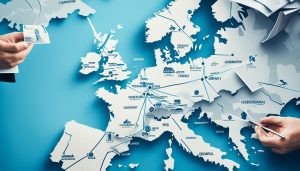Europe attracts American entrepreneurs with its different markets, eager customers, and deep cultural roots. It’s home to over 740 million people, making it one of the biggest consumer markets. To succeed here, you must understand the various cultures, consumer habits, and business ways. Knowing local traditions, cultures, and languages boosts your chances of success.
To avoid fines, it’s vital to understand Europe’s complex laws and GDPR rules. The EU offers a lot of help for businesses, including advice on setting up a company, VAT, excise duties, and taxes. You should also know about EU funds, product standards, compliance, and work laws to run your business well in this area.
Europe’s varied market is very appealing to North American businesses looking to grow. Despite the early hurdles, breaking into this large trading zone offers great opportunities within the EU and elsewhere.
Key Takeaways
- Understanding varied cultures, consumer behaviour, and European business practices is essential for success.
- Complying with complex legal systems and GDPR regulations can prevent costly penalties.
- The EU provides guidance on company formation, VAT, excise duties, and corporate taxes.
- EU support measures include funds, product standards, and labour laws.
- Europe offers high purchasing power and a significant talent pool, benefitting North American businesses.
Understanding the European Market Dynamics
The European consumer market is very diverse and large. Knowing about this region is key for business success.
Market Size and Diversity
With over 740 million people, Europe gives businesses a big, varied consumer group to serve. The differences in geography and the mix of city and countryside people show Europe’s unique consumer market. A detailed analysis is vital to meet local tastes.
Consumer Behaviour Across Regions
Consumer habits differ greatly across Europe. In the North, they might prefer green and quality items. In the South, the focus could be on local products. Knowing these habits helps companies plan well and match what locals want.
Sector-specific Insights
Different market sectors offer various chances and hurdles. It’s crucial to spread out into multiple sectors. This strategy helps companies lower risks and find new growth areas. SMEs are at the heart of this, making up 99% of businesses. They lead in driving forward sustainable and digital industries. Getting specific sector advice is key for businesses to do well.
Legal Requirements for Starting a Business in Europe
Starting a business in Europe means you’ll face various unique legal rules. Each country has its own laws for businesses. It’s crucial for American entrepreneurs to understand these laws for a smooth entry into the European market.
Country-specific Legal Frameworks
The EU has different regulations for each country, affecting businesses. Entrepreneurs should learn about the local laws to follow them correctly. For example, Germany’s businesses must follow the Handelsgesetzbuch (HGB), and France has the Code de commerce.
Company Registration Steps
While registration steps vary in Europe, some parts are the same. You need to choose a company name, decide the business type, and register with the chamber of commerce. In the UK, you register with Companies House. In France, it’s the Centre de Formalités des Entreprises (CFE).
Hiring Notaries and Legal Advisors
Hiring notaries and legal advisors in Europe is essential. In countries like Italy and Spain, notaries are key for preparing and certifying documents. Legal advisors help with VAT, excise duties, and taxes. They ensure everything follows the local laws.
Grasping the General Data Protection Regulation (GDPR)
Understanding GDPR is key for American companies working in Europe. It’s vital not just to follow the rules but to ensure data safety. By knowing these rules well, companies can avoid big fines and show they care about keeping customer data safe.
Focus on these important points: getting clear permission to collect data, having strong data security, and letting people access or delete their data. This care in handling customer data builds trust and credibility with European customers.
Companies must also keep their policies up to date to match Europe’s changing data protection scene. Having a data protection officer helps a company keep up with GDPR, making data handling open and secure.
- Strict adherence to data protection principles is non-negotiable under GDPR.
- Companies must provide clear data usage policies to customers.
- Regular audits and updates to data protection practices are essential.
Being good at GDPR compliance is vital for keeping data safe in Europe. It tells customers their information is in good hands, a must for doing well in the European market.
Choosing the Right Business Location in Europe
Choosing the right European business location is crucial. It can deeply affect your company’s success. Picking a spot that’s strategically good can help you reach more customers. It also makes your business run more smoothly.
Tax Policies and Incentives
Different European countries offer unique tax incentives aimed at international companies. The Netherlands and Ireland, for instance, are famous for their low taxes. Their tax systems are made to attract businesses from abroad and boost their economies.
When looking at locations, think about these points:
- Compare corporate tax rates
- Look for special incentives for your sector
- Get to know the local regulations
Access to Markets and Infrastructure
Finding a European business location that offers easy strategic market access is key. Being close to important markets can cut down transport costs and make your supply chain better. Good infrastructure makes running a business easier too.
Consider the following factors:
- Transportation and logistics networks
- Proximity to big markets and businesses
- Quality and availability of business spaces
Getting these aspects right will help you reach more customers. And it will allow your business to work well in Europe.
Market Research and Competitor Analysis
For American entrepreneurs, diving into the European market requires deep research. They must look into consumer insights and industry reports thoroughly. This ensures they make decisions that are well-informed.
Utilising Market Reports and Consumer Surveys
Market reports and consumer surveys are key to understanding Europe. They give detailed consumer insights, showing trends, preferences, and buying habits. By using this information in their marketing plans, businesses can improve their position in the market greatly.
- Industry-specific studies offer deeper insights into market dynamics.
- Consumer surveys reveal essential information about regional preferences and buying habits.
- Tailoring products and services based on these insights can significantly boost customer satisfaction.
Understanding Local and International Competitors
Knowing your competitors is crucial. American entrepreneurs need to examine both local and global rivals to find their strengths and weaknesses. This helps in creating strategies that place them ahead in a tight competition.
- Analyse the market presence and strategies of leading competitors.
- Understand regional competitive advantages and potential challenges.
- Adopt best practices and innovative approaches identified through competitor analysis.
The Enterprise Europe Network (EEN) is a huge help for businesses. It gives them access to vast European market research, expert advice, and networking chances. With EEN’s support, firms can better understand and navigate the complexities of the European market.
Understanding Business Structures in Europe
Choosing the right business structure is key for any entrepreneur entering the European market. Europe has different business entities, each with its own pros and cons. Knowing these differences helps make a wise decision.
GmbH (Germany)
In Germany, the Gesellschaft mit beschränkter Haftung (GmbH) is very popular. It offers limited liability, so owners can keep their assets safe. The GmbH needs at least €25,000 to start, with half due before registration. It’s a good choice for those wanting investor protection and a solid regulatory setup.
SARL (France)
In France, the Société à Responsabilité Limitée (SARL) is a go-to structure. It also provides limited liability to protect personal assets. The SARL is ideal for small to medium businesses. It has easy operating rules and a low minimum capital of €1. This makes managing finances simpler for entrepreneurs.
Ltd (United Kingdom)
The United Kingdom’s Private Limited Company (Ltd) is known for being flexible and easy to start. You only need one shareholder and one director. Setting it up online is quick. The Ltd benefits from the UK’s tax system and strong legal framework. This makes it great for businesses focusing on efficiency and less regulation.
Choosing between a GmbH, SARL, or Ltd depends on your business size, regulatory needs, and specific goals. Understanding these options is crucial for your business’s success and growth.
Managing VAT and Other Tax Obligations
Understanding VAT and corporate tax is key for US business owners in the EU. The different VAT rates and tax rules affect your business’s finance and legal standing.
Value Added Tax (VAT)
VAT is a tax on goods and services at every production and selling point. It’s key to get VAT right to avoid big fines and legal troubles. With varying VAT rates across EU countries, businesses need smart pricing. Getting VAT compliance right keeps transactions in the EU smooth.
Corporate Tax Rates
Corporate tax rates in Europe change from one country to another. Knowing these rates is good for US entrepreneurs. While some EU countries attract businesses with low tax rates, others have higher rates but offer incentives. This knowledge helps in managing taxes well, fitting your business plan, and staying legal.
Securing Funding and Financial Support
European entrepreneurs have many financial support options to help them grow and innovate. They can choose from venture capital, EU business grants, to specific start-up financing solutions.
Venture Capital Opportunities
The European venture capital scene is dynamic and offers great opportunities for start-ups. Venture capital firms look for businesses with strong growth prospects. By partnering with these firms, start-ups can get the funds and strategic advice they need to expand and compete effectively.
EU Grants and Incentives
EU business grants play a crucial role in supporting innovation and growth. The European Union provides various grants and incentives for technology, sustainability projects, and new solutions. These grants, given by regional or national bodies, are available to a broad range of businesses.
Start-up Loans
Start-up loans are a fitting option for new businesses needing initial funding. The EU backs these loans through intermediaries to aid emerging companies. They are tailored for start-ups, offering the funds needed for early stages, from developing a product to entering the market.
Navigating the European Banking Landscape
For American entrepreneurs, it’s important to grasp the European banking system for success. Europe’s banks have unique rules that you need to follow. This ensures your business moves cash smoothly and follows the law.
Regulatory Differences
The rules for banking in Europe are different from the US. It’s crucial to know about the Know Your Customer (KYC) rules and anti-money laundering laws. Understanding these differences helps you operate legally. It also makes financial dealings smoother and improves your reputation in the market.
Residency Requirements for Bank Accounts
Opening a bank account in Europe often requires you to be a resident. Different countries have different rules for non-residents. Knowing what these rules are can make opening an account easier. Getting advice from local financial experts is also smart.
Using Banks with a Presence in Both the US and Europe
Choosing banks that work in the US and Europe can make things much easier. Banks like HSBC, Citibank, and JPMorgan Chase help manage your money in both places. They know both American and European rules. This means you can manage your money better and look more credible as an entrepreneur.
In the end, knowing how banks work in Europe is key for US entrepreneurs looking to grow there. Using experts in cross-border finance helps too. This can lead to a successful start and growth in the European market.
Language and Communication Considerations
When doing business in Europe, it’s vital to communicate in multiple languages. Europe has many languages, making good communication key. Knowing local languages can strengthen business relationships and boost your success.
Understanding European languages helps in daily talks and important negotiations. Creating communication plans for different languages can help overcome cultural differences. This makes talks easier and more successful. Your team should know many languages, or you should use translation services.
Good communication in many languages builds strong ties with locals, clients, and customers. Companies that get the complexity of European languages do better in negotiations. This leads to a more inclusive and successful business scene.
Importance of Cultural Awareness and Business Etiquette
Doing business in Europe means understanding European business etiquette. It’s about knowing the cultural differences that affect how people work together. Every country in Europe has its own way of doing things. This includes unique traditions and professional protocols.
Local Customs and Traditions
In Europe, every country’s culture impacts how business is done. For example, being on time is very important in Germany. It shows you respect the schedule. On the other hand, in Spain, business meetings may last much longer. This highlights the value of building relationships and having detailed discussions. Knowing these differences helps build respect with local partners.
Building Trust and Credibility
In European business, trust is key. Showing you understand the culture and follow professional protocols helps build trust. Good communication, paying attention, and showing real interest in the local ways are important. These actions build trust, essential for success in Europe. Being genuine and aware of cultural nuances makes a big difference in business ties.
Product Standards and Compliance in the EU
Meeting EU product standards is key for companies wanting to sell in the European Union. It makes market entry smoother and boosts consumer trust and brand credibility.
EU product standards include rules to protect the environment and consumer safety. They relate to design, materials, and safety, ensuring products are safe for users.
Businesses also have to follow rules on labelling, packaging, and paperwork. Doing this right means products can be sold legally, avoiding legal issues and fines.
To ensure they meet these standards, companies work with regulatory bodies and certifying organisations. This isn’t just red tape; it’s crucial for consumer safety and brand reputation in Europe.
In short, knowing and applying EU product standards and compliance regulations is vital for businesses in Europe. It shows a dedication to quality and guarantees the reliability of products, leading to ongoing success in the market.
Employment and Staff Welfare Regulations
To succeed in Europe, businesses must grasp EU employment law. These laws guide on employment terms, contracts, and staff talks. They help keep businesses in check and improve work environments.
Terms of Employment
Clear employment terms are a must under EU law. These include the job role, pay, hours, and holidays. Having clear, fair agreements helps keep staff happy and lowers dispute chances.
Work Contracts Compliance
For EU businesses, sticking to work contract rules is key. Contracts need to clearly state duties, pay, and how to end the contract. This protects firms legally and builds trust with workers, boosting their well-being.
Utilising the European Talent Pool
Europe has a vast, diverse talent pool, making it ideal for businesses aiming to grow. American entrepreneurs can tap into this to gain an edge and drive growth. This talent spans many industries, enriching US firms with varied expertise.
Access to Skilled Labour
Europe is filled with highly skilled professionals, from engineers to marketing experts. Accessing this talent helps companies grow and stay ahead in innovation. Europe’s top universities keep supplying fresh talent, ready to excel in the business world.
Remote and Hybrid Working Models
Europe’s advanced remote and hybrid work models offer great flexibility. This attracts talent seeking work-life balance, helping companies keep their best employees. Such flexibility aids in overcoming distance barriers and creating an inclusive workplace.
American firms gain significantly by tapping into Europe’s talent and flexible work models. It’s key for entering European markets and boosting global growth. This strategy is crucial for entrepreneurs aiming at European success.
Related posts:
 Advantages and Disadvantages of Doing Business in Europe
Advantages and Disadvantages of Doing Business in Europe  Eight tips for doing business in Europe
Eight tips for doing business in Europe  What is Needed to Start a Business in Europe
What is Needed to Start a Business in Europe  How To Market Your Business In Europe?
How To Market Your Business In Europe?  Starting Your Beauty Business in the UK and Europe
Starting Your Beauty Business in the UK and Europe  Steps of Starting a Business
Steps of Starting a Business  EMI Banking Solutions in Europe
EMI Banking Solutions in Europe  Business Consulting Services in Europe
Business Consulting Services in Europe  Doing Business in Europe in 2025
Doing Business in Europe in 2025  How to Start a Successful Business in Europe
How to Start a Successful Business in Europe





